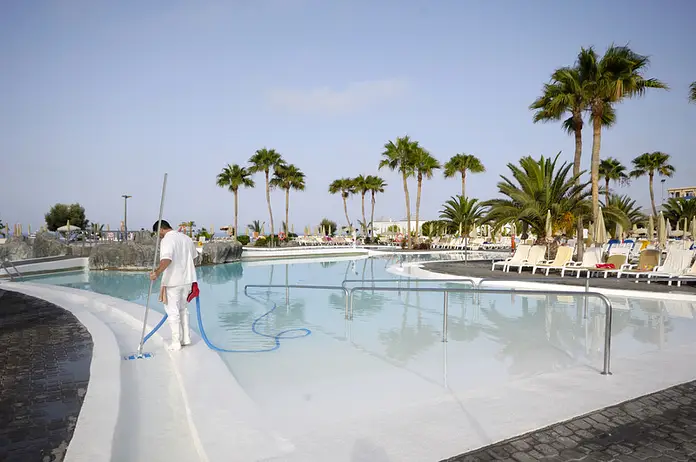A swimming pool can be a delightful addition to your property, offering relaxation, recreation, and a place to cool off during hot summer days. However, with great enjoyment comes great responsibility. Pool ownership comes with a duty to maintain your pool properly to ensure not only its longevity but also the safety of those who use it. Neglecting pool maintenance can lead to accidents and potential liability issues. In this blog, we will explore the essential pool maintenance tasks that are crucial for liability protection.
1. Regular Cleaning and Skimming
Regular pool cleaning is fundamental to keeping your pool safe and inviting. Debris such as leaves, twigs, and insects can accumulate on the surface of the water and sink to the bottom, creating slip hazards and compromising water quality. Proper cleaning and skimming prevent these issues.
Here’s what you should do:
- Skim the pool’s surface daily to remove debris.
- Vacuum the pool’s bottom and sides weekly or as needed.
- Brush the pool’s walls and tiles to prevent algae growth.
A clean pool not only looks better but also reduces the risk of accidents.
2. Maintain Proper Water Chemistry
Balanced water chemistry is crucial for the safety of swimmers and the longevity of your pool equipment. Poor water quality can lead to skin and eye irritation, and in severe cases, it can promote the growth of harmful bacteria.
Regular water testing and adjustments are essential:
- Test the water’s pH level, chlorine level, and alkalinity level at least once a week.
- Use appropriate chemicals to maintain the right balance.
- Shock the pool periodically to eliminate bacteria and algae.
By keeping your pool’s water chemistry in check, you ensure a safe and pleasant swimming environment.
3. Install Proper Pool Fencing
Safety should be a top priority for pool owners, especially if you have young children or pets. Installing a proper pool fence is not just a good practice; it may also be legally required in your area.
Here are some key considerations for pool fencing:
- Ensure the fence is at least four feet tall with a self-latching gate.
- Regularly inspect and maintain the fence to ensure its integrity.
- Keep the pool area locked and secure when it’s not in use.
A well-maintained pool fence can help prevent unsupervised access to your pool and reduce the risk of accidents.
4. Check and Maintain Pool Equipment
Pool equipment, including pumps, filters, and heaters, plays a crucial role in the proper functioning of your pool. Neglecting equipment maintenance can lead to malfunctions, reduced water circulation, and water quality issues.
Here’s what you should do:
- Regularly inspect equipment for signs of wear, leaks, or damage.
- Clean and lubricate moving parts as needed.
- Schedule professional servicing to ensure optimal performance.
Well-maintained pool equipment not only ensures a safe swimming experience but also extends the lifespan of your pool system.
5. Practice Safe Handling of Chemicals
Pool chemicals are necessary for maintaining water quality, but they can be hazardous if mishandled. Proper storage, handling, and disposal of pool chemicals are essential to prevent accidents and ensure safety.
Follow these safety guidelines:
- Store pool chemicals in a cool, dry, and well-ventilated area.
- Keep chemicals out of the reach of children and pets.
- Wear appropriate protective gear, such as gloves and goggles, when handling chemicals.
- Follow the manufacturer’s instructions for handling and disposal.
Adhering to safe chemical practices reduces the risk of accidents and injuries associated with pool maintenance.
6. Conduct Regular Pool Inspections
Regular pool inspections are essential for identifying potential safety hazards and addressing them promptly. Consider scheduling a professional pool inspection at least once a year.
Key inspection areas include:
- Pool structure and foundation integrity.
- Pool deck and surrounding areas for tripping hazards.
- Pool equipment, including pumps, filters, and electrical systems.
- Safety features such as pool fencing and alarms.
A professional inspection can help you identify and address potential liability issues before they become major problems.
Conclusion
Owning a pool can provide endless enjoyment, but it also comes with responsibilities. Proper pool maintenance is not just about aesthetics; it’s about safety and liability protection. Neglecting pool maintenance can lead to accidents, injuries, and potential legal consequences.
By following essential pool maintenance tasks, such as regular cleaning, maintaining proper water chemistry, installing proper pool fencing, checking and maintaining equipment, practicing safe handling of chemicals, and conducting regular pool inspections, you can ensure the safety of those who use your pool and protect yourself from potential liability issues.
Remember, pool maintenance is not something to be taken lightly, and it’s not a DIY task. It’s important to hire qualified professionals when needed to ensure that your pool is safe, well-maintained, and compliant with local regulations. By prioritizing pool maintenance, you can enjoy your pool with peace of mind, knowing that you’ve taken the necessary steps to protect both your loved ones and yourself.
Riverside County Pools https://www.riversidecountypools.com/
